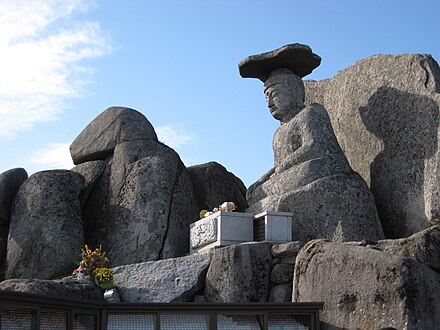North Gyeongsang - province in South Korea
North Gyeongsang (경상 북도 Gyeongsangbuk-do, 慶尙北道) is a province of South Korea where Buddhist traditions of the Silla kingdom and the center of Confucian philosophies meet.
Cities
- Andong 📍 — home to the Hahoe Folk Village and Confucian teachings, as well as being famous for growing among the most delicious apples in all of Korea.
- Daegu 📍 — the largest city in the province.
- Gumi 📍 — industrial city considered the hub of the Korean electronic industry.
- Gimcheon 📍 — the city with a number of beautiful parks and the famous temple, Jikjisa.
- Gyeongju 📍 — the former capital of the Silla kingdom.
- Mungyeong — a former coal-mining town.
- Pohang 📍 — center of steel production, and the largest port city on the east coast where ferries leave for Ulleungdo.
- Yeongcheon 📍 — historic city full of temples.
Other destinations

- Cheongdo County — a key transportation hub for highways, railways, and national roads
- Cheongsong County — known among Koreans for its apples and for the Cheongyang Pepper.
- Chilgok County —
- Dokdo 📍 island — east of Ulleungdo, a small disputed island rich in natural resources beneath the sea.
- Goryeong 📍
- Gunwi County 📍
- Juwangsan National Park 📍 — smallest of the national parks, known for its striking shaped limestone peaks and clear waterfalls.
- Cheongnyangsan Provincial Park 📍 — remote with few crowds even in peak season, also one time residence of several notable scholars, kings and holy men.
- Palgongsan Provincial Park 📍 — sprawling forests, near Daegu, it's home to numerous cultural assets.
- Seongju County 📍
- Ulleungdo island 📍 — a remote scenic island in the middle of the east sea.
- Yeongdeok County 📍 — known for its Snow Crab Festival
- Uljin County
Understand
Dotted with historic temples and grandiose park reserves, this region is the cultural centre of the country. Gyeongju, listed as one of the world's 10 most important ancient cultural cities by UNESCO, is where you'll find the venerated remnants of the longest-running state in Korean history, the Silla kingdom. Andong is the gateway to Confucian teachings and Korean traditions. Still guided largely by Confucian rules, this area is considered one of the more conservative regions in South Korea.
Geographically, North Gyeongsang is bordered by Sobaek-san, a mountain range that includes Songni-san, in the north and in the west. And in the east before meeting the sea are the Taebaek Mountains that reach down from North Korea.
Talk
The Gyeongsang province including the south as well as the north have a distinctive accent that many Koreans consider harsher than, say, the Seoul accent. The accent has more tones to it and sounds more rhythmic. It may be compared to how Japanese sounds.
Get in

There's an international airport in Daegu (IATA: TAE) with limited connections to China and Japan. Other international flights come to Busan and Seoul, and the KTX high-speed train passes through North Gyeongsang on its way between those cities. There's also several normal-speed train lines in the province, and buses run just about everywhere.
Ferries run from Pohang to Ulleungdo island.
Get around
Buses and taxis.
See


Most of the attractions are naturally around the historically rich Gyeongju area.
- Bulguksa has a representative relic from the Silla Dynasty.
- Goryeong Daegaya Historic Site features historical remains of the Gaya confederacy that flourished for 520 years during the Three Kingdoms period.
- Hahoe Village is a well preserved, living, functioning traditional village from the Jeoson era based on Confucian traditions.
- Yeongyang Firefly Eco Park
- Seokuram Grotto has one of the world's finest shrines of Buddha. Both Seokguram Grotto and Bulguksa have been inducted into the list of World Cultural Heritage sites from UNESCO.
- Buseoksa is the home of the second oldest wooden structure and head temple of the Hwaeom sect of Mahayana Buddhism
- Jijiksa in the town of Gimcheon is one of the oldest temples in South Korea.
Do
Eat
Not normally distinguished for its food, the region's best known regional speciality is the Andong jjimdak — chunks of chicken with potatoes and transparent noodles in a sweet and spicy dark sauce. Andong, the city rich in Confucian traditions, is where you will find restaurants that serve the dish.

Drink
Also from Andong, the best known beverages are soju and sikhye. Soju is well-known nationwide, but Andong's version of sikhye has a little twist. Normally a cloudy white colour elsewhere in Korea, the drink is made here with red pepper powder, which makes the liquid pink and the taste a little spicy. Best drunk with peanuts or pine nuts.